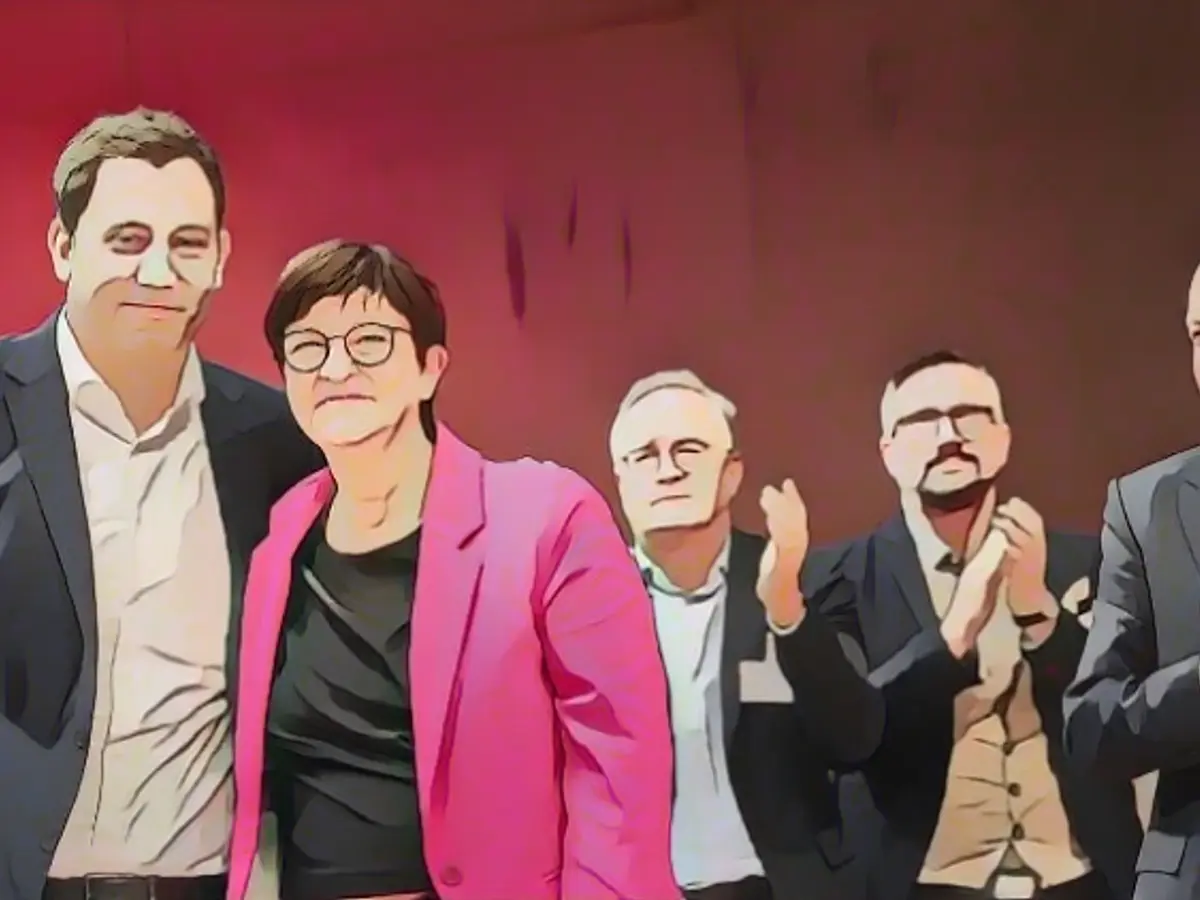Esken and Klingbeil re-elected with a large majority
On the first day of their federal party conference in Berlin, the Social Democrats confirm their two leaders in office. Despite the difficult situation of their party in the polls and in the federal government, both receive good results. Esken becomes the longest serving SPD leader since 1945.
SPD leaders Saskia Esken and Lars Klingbeil have been elected for a further two years in office. Esken received 82.6 percent of the vote after receiving 76.6 percent in 2021. Klingbeil received 85.6 percent of the delegates' votes. Two years ago it was 86.3 percent. Both accepted the election. Of the 588 votes cast, Esken received 483 yes votes, while Klingbeil was elected with 501 yes votes. SPD General Secretary Kevin Kühnert and the extended party executive will also be newly elected at the party conference at the Berlin Exhibition Center.
Esken is thus entering her third term in office, having formed a top duo at the head of the party for the first time in 2019 together with Norbert Walter-Borjans. Walter-Borjans decided not to stand for re-election after the 2021 general election. With six years, Esken would be the fourth longest serving party leader of the post-war period until the next election together with Kurt Schumacher - after Sigmar Gabriel (7.5 years), Erich Ollenhauer (10 years) and Willy Brandt (22 years).
At the beginning of her speech, Esken referred to the SPD's disastrous poll ratings when it was first elected four years ago. Nevertheless, the SPD had become the governing party two years later. In the RTL/ntv trend barometer, the SPD currently ranks on a par with the Greens at 14%, trailing behind the AfD with 22% and the CDU/CSU with 30%. However, these figures did not diminish Esken and Klingbeil's election results any more than the sometimes bitter defeats in state elections, most recently in Bavaria and Hesse.
"Not prepared to give up the welfare state"
In their candidacy speeches, both chairmen spoke of difficult times for the country and the party. The federal government has still not been able to draw up a budget for next year. Esken warned that "the country will collapse" if social cohesion is undermined. She called for a reform of the debt brake so that investments in the economy and climate protection are still possible without social cuts.
"The financing of crisis management must be rethought as a result of the ruling by the Federal Constitutional Court. And the financing of major intergenerational tasks, such as climate change, must also be put on a new footing," said Esken. Neither of these can be financed from the core budget. "And we are certainly not prepared to give up our welfare state for this."
Klingbeil warned against only the loud ones dominating the discourse. The SPD must focus on the concerns and issues of those who cannot be heard, but who work every day and care about their fellow human beings. "These are the people who get up in the morning and go to work, who want a good future for their children. Who have to make up for every daycare strike and every missed school day. But who still don't call in sick to work, who tear themselves apart," said Klingbeil. "They would perhaps also like to scream sometimes, but not in anger, but in exhaustion." The SPD must make policy for these people.
"Politics shouldn't be about whether someone drives a car, eats bratwurst or flies to Mallorca once a year, not about what language we speak or whether we use gender," said Klingbeil. It's about "affordable rents, good wages, decent care and the best education", said Klingbeil.
Read also:
- Year of climate records: extreme is the new normal
- Precautionary arrests show Islamist terror threat
- SPD rules out budget resolution before the end of the year
- Numerous oil, gas and coal lobbyists at climate conference
At the SPD party conference in Berlin, Saskia Esken and Lars Klingbeil were re-elected as party leaders with significant majorities, despite the party's challenges. SPD General Secretary Kevin Kühnert and the extended party executive will also be elected during the conference.
Despite facing criticism and low poll ratings, Saskia Esken delivered a speech at the conference, emphasizing the importance of social cohesion and addressing the need for reform of the debt brake and financing of major intergenerational tasks, such as climate change, without sacrificing the welfare state.
Source: www.ntv.de








